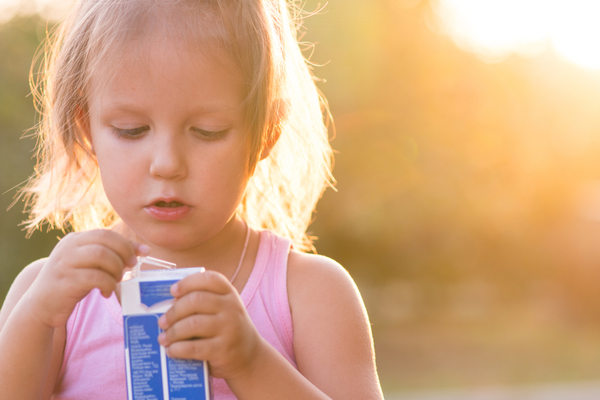An eye-opening new study that looked at children’s popular sweetened fruit drinks found that they are often loaded with added sugar or contain artificial sweeteners (and in some cases, both). But most parents don’t realize this thanks to manufacturers’ advertising campaigns and packaging, which make these sweetened beverages appear to be healthy choices.
In the study, researchers at the University of Connecticut’s Rudd Center for Food Policy and Obesity analyzed 34 popular kids’ drinks that contained low-calorie sweeteners and added sugars (such as high-fructose corn syrup and cane juice), as well as drinks without sweeteners, such as 100 percent juice drinks. The study revealed that, overall, 74 percent of children’s sweetened drinks contained low-calorie sweeteners, 65 percent had added sugars, and 38 percent contained both. In fact, in 11 different children’s fruit drinks — “including many of the highest-selling brands, such as Capri Sun Juice Drink, Hawaiian Punch, Sunny D, and Minute Maid Lemonade,” per the study — a single serving contained more than 50 percent of the recommended amount of daily added sugar for children.
What’s more, although the majority of the kids’ fruit drinks had images of fruit on the label, most did not contain any fruit juice whatsoever. “Most of them didn’t have any juice,” says Jennifer Harris, PhD, lead author of the study and director of marketing initiatives at the University of Connecticut’s Rudd Center for Food Policy and Obesity. She notes that even though 85 percent of the drinks showed fruit on the label, only 35 percent contained any juice at all. “I don’t think parents realize that,” she adds.
Harris says that there are a few “egregious” things going on when it comes to the marketing of these sweetened fruit beverages. “The packaging of the drinks seem to really be designed to make them seem like they’re healthier than they really are — pictures of fruit on the packages,” she says. “The sweetened drinks say things like, ‘Good source of vitamin C’ or ‘100 percent vitamin C.’ They say ‘less sugar than the leading juice’ or ‘less sugar than soda.’ I have parents tell me they’ve been tricked. When they bring them home and look at what’s in it, they can’t believe they bought it.”
The American Academy of Pediatrics recommends that the maximum amount of added sugar that kids consume daily is 25 grams. Ideally, the sugar that kids consume should primarily come from dairy, whole grains, and fruit. What makes these sweetened fruit drinks deceiving is that, in some cases, the sugar content is lower than other typically sugary beverages, such as soda, because the manufacturers are using artificial sweeteners. “A lot of the products have brought down the sugar by adding the low-calorie sweeteners,” notes Harris. Should kids be consuming artificial sweeteners? Harris says, “experts don’t recommend them because there’s no evidence that they’re safe or don’t have long-term health impact.”
Currently, the FDA does not require manufacturers to report the actual amounts of sweeteners contained in foods and beverages, but that will change starting on January 1, 2020, when the FDA’s update to the nutrition facts label goes into effect, which requires large brands with $10 million or more in sales to list added sugars on the label found on the back of all products. (Smaller brands have until 2021 to make these changes.)
So what can parents do to make sure they’re choosing healthy drinks for their kids? Check the label. Harris recommends looking for 100 percent juice on the front label. That said, “experts don’t recommend that children drink very much 100 percent juice,” she says. “A small amount is ok. What parents can do is just add a little bit of water to the juice to make it less sweet.”
Another option: drinks that are juice/water blends — in other words, watered-down juice — such as R.W. Knudson Family Sensible Sippers, Honest Kids, and Juicy Juice Splashers Organic. Next, before buying kids’ fruit drinks, check to see how many grams of sugar they contain, keeping in mind that 25 grams is the maximum amount of added sugar that children should consume in a single day. Then, look at the ingredient list for added sugars (such as high-fructose corn syrup, sucrose, or cane juice), as well as words like “aspartame,” “sucralose,” “stevia,” “saccharin,” “acesulfame,” and “neotame,” which are the names of artificial sweeteners.
Finally, whenever possible, serve kids plain water or low-fat, unflavored milk. Try adding cut up fruit to plain water for flavor. Harris says, “it’s important to know the companies are not helping parents in that respect. So you have to be diligent about what you’re buying.”
—
Photo Credit: Tiplyashina Evgeniya / Shutterstock.com
